The brilliant Raise/See mechanic in the tabletop RPG “Dogs in the Vineyard”
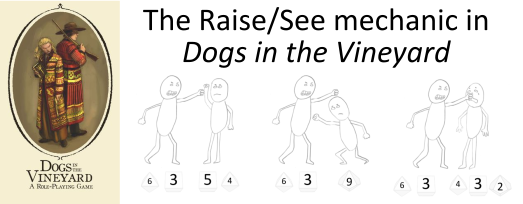
A really cool aspect of the Dogs in the Vineyard tabletop roleplaying game is the Raise/See mechanic. It's at the heart of the conflict resolution mechanism. I'm going to explain it (slightly differently than the way the book does), illustrating it with a simple action in a fistfight.
You start with a Raise
Whenever you're in a conflict you'll have a pool of rolled dice in front of you (don't worry about how they got there for now, that will be a topic for another post). The numbers on the dice are what you use to interact with the mechanics. The player whose turn it is to Raise puts forward two dice along with a description of how they're attacking. In this case, “I throw a punch right at your face, with all my weight behind it.” Using the dice this way removes them from your pool.
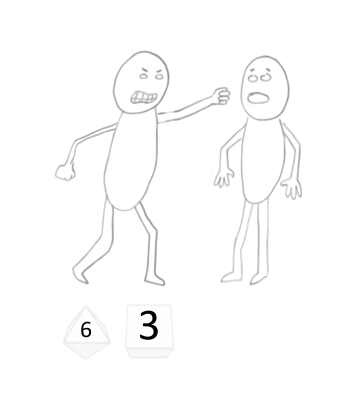
The target of the Raise needs to See it
The character on the receiving end needs to be able to match the sum of the dice used in the Raise. This is their See. The common case is that you'll use two dice of your own, which is a dodge or a block, and you describe how the attack doesn't have an effect on you. In this case, “I get my arm up and deflect your punch off to the side.” Just like a Raise, this uses up the dice you use. The important thing to remember is that this is just dodging or blocking, not a counter-attack – you'd do that when it's your turn to Raise.
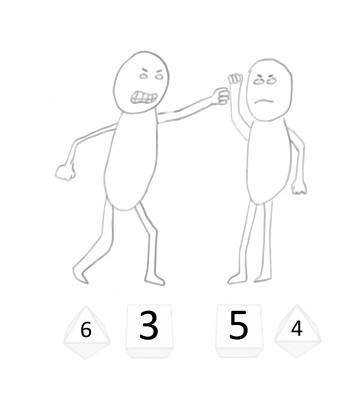
If you can match the raise with a single die then you can “Reverse the Blow”, kind of combining your defense into an especially effective counterattack. In this case, something like: “I duck under your punch, and your momentum is going to make the punch I'm aiming at your gut hit extra hard.” The die you use for the See doesn't get used up immediately, you get to use it as one of the dice in your counter-attack Raise.
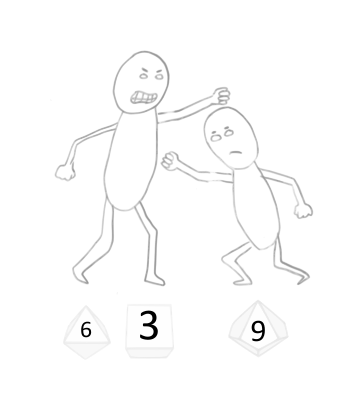
If you use three or more dice to See then that's taking the blow, you describe how the attack hits and hurts you. In this case, maybe: “Your punch hits me right in the nose with a crunch, blood starts streaming out of it and my eyes start watering from the pain.” Taking the blow also causes to you take some “Fallout” which affects you at the end of the conflict (during the excitement and adrenaline of a conflict you can never be completely sure what the long term impacts will be, you just know how badly the blows hurt).
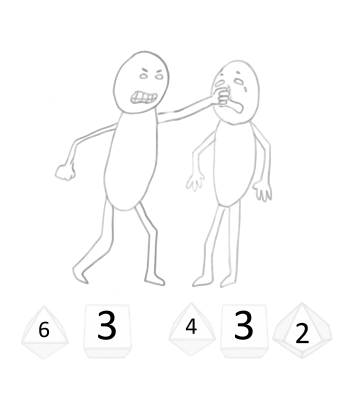
In order to strategize your dice you end up considering all the options
For both mechanical and character reasons you have to think about how you want to See each Raise that comes at you. Because your pool of dice is a semi-limited resource, and because taking fallout can cause long-term consequences you might want to avoid, like being injured or killed, you have to decide which dice you want to use up with the See and how badly the blow would hurt if you took it. That tends to cause you to think about it from your character's perspective, too: are they willing to take some punishment so that they can dish more out later? Are they so proud that anyone getting a good shot in would bruise their fragile ego? This really makes you think about what effect the attack would have on your character if you let it land, how much it would hurt, and how much hurt your character is willing to take right now.
And now the cool twist: This is how verbal arguments work, too
I like to explain how the Raise/See mechanic works with a fistfight example because it makes it easy to distinguish the important difference between what's coming at you (the Raise) and how it lands (the See). But DitV uses a unified conflict resolution mechanism: the exact same mechanics that you use for fistfights are used for having an argument (in fact you can shift to the different aspects in the course of the conflict with the escalation mechanic: if people get heated enough in their argument maybe someone will throw a punch, if a fight doesn't seem to be going well maybe someone will pull out a gun).
Now, in a talking conflict, the Raises are things your character says that you think would have an impact on the other character. You're not throwing a punch literally, but your words can pack a punch. For example, maybe a grizzled old farmer who doesn't like the player's teenage character telling him what to do would say something like “What do you know about anything? You're just a kid!”
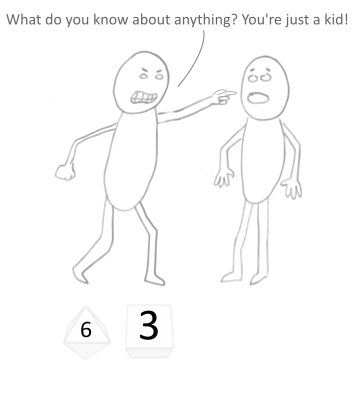
Now the Sees aren't things like deflecting the punch with your arm, they're things like rationalizing why their argument doesn't affect you. “I may be a kid, but I'm not stupid.” Or, if you take the blow, how it does affect you. “He's right, I don't know anything about the real world, maybe I'll just screw everything up.” And because the person putting forward the Raise knows that the other player will need to See it they have an incentive to not just put up insubstantial bluster but to come up with juicy things to say that could land like an emotional gut-punch.
Keeping your See and your next Raise distinct is a lot harder in an argument
People's natural instinct when they're roleplaying an argument (or having a real argument) is to just retort or shout back immediately. But with the Raise/See system, DitV encourages you to slow it down and think about how your opponent's words land before responding with your own. An argument in the DitV conflict system isn't just shouting with turn-taking. Because you need to consider whether you want to take the blow you have to really think about what the other character said. This can make an argument in DitV feel powerful and dramatic, which is tonally exactly what you want for a game where the situations involve trying to untangle messy noir-style situations or life-and-death philosophical disputes about how to live life on a hard, unforgiving frontier.
It's not exactly realistic – like arguments on the internet most real arguments involve people talking past each other rather than really communicating – but it has the verisimilitude of a compelling movie or TV drama or the way philosophical or political debates seem like they ought to happen, with the words people speak really mattering to the people they're arguing with.
DitV is a new one on me and I'm going to check it out as a result of seeing your post here, so thanks!
I play a lot of RPGs solo since it's hard even to get my group together on Roll20, so for example right now I am playing/writing my way through a solo campaign of Traveller (a combination of Classic Traveller Adventure 4: Leviathan, mixed with the latest Mongoose Traveller Reach Adventure 4: The Last Flight of the Amuar, using a combination of the Cepheus Engine version of the Traveller rules and the SOLO supplement for 'fun/adveture in the middle' solitaire RPG resolution. Phew, that was a mouthful.)
The Raise/See mechanic looks really appropriate for solo play - I have only just read your post and am thinking about it, but I'm really inclined to use it in a couple of key dramatic situations to see how things turn out. I love the narrative freedom of it and the pretty universal applications of it.
Thanks for a great post - and for taking the time to describe the mechanic. I think it will fit in very nicely with what I am doing right now.
First off, I love the artwork.
I've always wanted to play DitV, but never got the chance and finding a copy of the hardcover book (for my collection) is one of my "Holy Grails"
The Raise and See mechanics are intriguing, to say the least, and I've been tempted to shoehorn it into a homebrew system I've been creating over the years (that will, quite possibly, never see the light of day as it is a mess).